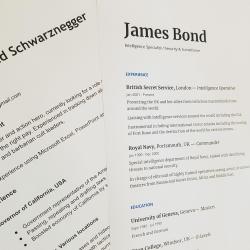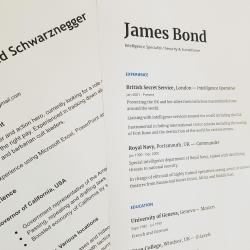How to Write a Resume for an Entry-Level Job
Securing your first full-time job after completing your education can be both exciting and daunting. One of the crucial steps in this journey is crafting a compelling resume that grabs the attention of potential employers. Even without extensive work experience, you can create a resume that highlights your skills, education, and potential. Here’s a guide to help you through the process.
1. Choose the Right Format
For entry-level positions, it's often best to use a chronological resume format or a combination format. The chronological format emphasizes your educational background and work history, while the combination format allows you to showcase both your skills and experience. You might choose the latter if you have significant skills from internships, volunteer work, or extracurricular activities.
2. Start with Contact Information
Ensure your contact information is up-to-date and professional. This section should include:
- Full Name
- Phone Number
- Professional Email Address (e.g., john.doe@gmail.com)
- LinkedIn Profile (optional, but recommended)
3. Craft a Captivating Objective or Summary
A resume objective is especially useful for entry-level job seekers. It's a brief statement at the top of your resume that outlines your career goals and highlights your passion for the industry. Be specific about the position you’re asking for and what you hope to achieve professionally.
Example:
“Motivated and detail-oriented marketing graduate seeking an entry-level position to apply skills in digital marketing and content creation at [Company Name]. Eager to contribute to innovative marketing strategies.”
4. Highlight Your Education
For entry-level candidates, education is often a primary selling point. List your educational institutions in reverse chronological order, including:
- Degree(s) obtained
- Name of the institution
- Graduation date (or expected date)
- Relevant coursework, honors, or awards (optional)
Example:
Bachelor of Arts in Communications
University of Anytown, Anytown, USA
Graduated: May 2023
- Relevant Coursework: Digital Media, Public Relations
- Dean’s List (2021-2023)
5. Showcase Relevant Skills
Even if you lack formal job experience, you have skills gained from academia, volunteer work, internships, or extracurricular activities. Identify and list 5-10 skills relevant to the job you’re applying for, such as:
- Communication and interpersonal skills
- Technical competencies (software, platforms, etc.)
- Leadership or project management abilities
- Languages (if applicable and relevant)
6. Present Experience Effectively
List any internships, part-time jobs, volunteer positions, or significant academic projects that relate to the job you’re applying for. Use bullet points to describe responsibilities and achievements.
Example:
Marketing Intern
ABC Marketing Agency, Anytown, USA
June 2022 – August 2022
- Assisted in developing content for social media platforms, increasing engagement by 20%.
- Coordinated promotional events, contributing to a 15% rise in client inquiries.
7. Include Additional Sections
Consider adding sections for certifications, volunteer work, extracurricular activities, or hobbies if they are relevant to the job or demonstrate desirable qualities like leadership, teamwork, or technical expertise.
Example:
Certifications
- Google Analytics Certification
- Certified in CPR and First Aid
Extracurricular Activities
- Member of the University Debate Team (2019-2023)
- Volunteered with Habitat for Humanity, participating in community housing projects
8. Tailor for Each Application
Customize your resume for each job application by analyzing the job description and incorporating keywords and phrases. This tailoring demonstrates your genuine interest and helps your resume pass through Applicant Tracking Systems (ATS), which many companies use to screen candidates.
9. Proofread and Edit
Before finalizing your resume, meticulously proofread it for grammatical and typographical errors. Consider having a mentor, advisor, or trusted friend review it for feedback.
10. Keep It Concise
For entry-level positions, aim to keep your resume to one page. Clarity and conciseness are important, as hiring managers often sift through numerous applications. Focus on the most relevant information to showcase your strengths effectively.
Conclusion
Writing a resume for an entry-level job may seem challenging, but with thoughtful organization and attention to detail, you can create a powerful document to capture employers’ attention. Highlight your education, skills, and any relevant experiences, and remember to tailor each resume for the specific job you're applying for. With patience and persistence, you’ll increase your chances of landing that first job and paving your professional path.





















